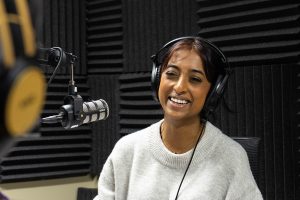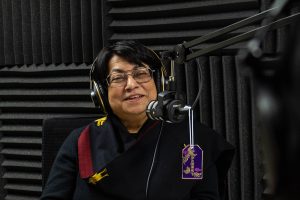Welcome to CLAS Connections, a minicast that spends a heartfelt five minutes with people from UConn’s College of Liberal Arts and Sciences. In each case, their special connection has had a profound and lasting impact on their lives.
Today, we hear from Akshayaa Chittibabu, a 2019 graduate and Holster Scholar, and her undergraduate advisor, Associate Dean for Social Sciences and Professor of Sociology Bandana Purkayastha. They discuss how one late night phone call accelerated their connection toward a family-like bond that they still share today. Here’s Akshayaa and Bandana.
Akshayaa: Do you remember the first time we met?
Bandana: Yes, I do. I remember, the middle of a normal working day, somebody walking into my office, saying: I’m thinking of going to India and doing this research. And I’m thinking furiously like: come again? You want to go to India to do research. So, and you’re an undergraduate. Are you a sociology major? “No.” Okay. Are you a social sciences major? “No.” That was the introduction.
Akshayaa: Yeah.
Bandana: My impression was very positive, though, because you wanted to do something. You had reached out to people who you felt could guide you with that. So, you were already doing the things that were necessary for somebody to carry out a successful research project.
Akshayaa: A lot of the hesitations I feel now, and the more that I know oh, I need to do all this preparation before I even think to talk to this person. I just showed up. I was like, oh, the sociology building’s right here. I live right here.

Why not just, you know, walk up there? I just knocked on your door. And I was like, what’s the worst that could happen? She says no. And you entertained me! I came in and you actually cared. You had no obligation to me. I wasn’t your student. I wasn’t even a sociology major, but you heard me out and then you actually were interested in what I was saying.
And that was such a powerful moment for me because I think if it went any other way, it would’ve reinforced a sense that I should be more timid, or I should wait till I’m older or have more classes under my belt. Instead, I was emboldened to — if there’s something I’m interested in, yeah. I should just go for it. And I think that that stayed with me throughout college.
Bandana: When you encountered those first challenges while you were on the field, that was a learning moment, both for you and me, I think. Do you remember that?
Akshayaa: Oh, definitely. I mean, I showed up to rural Tamil Nadu. But suddenly, I was in the middle of rural India with no internet.
Bandana: Here she is with this grant, with all of her plans falling through.
Akshayaa: There’s like one place that had internet in the local library. I was like, you know what? I just need to call Professor Purkayastha. And I think it was a very odd hour for you.
Bandana: It was pretty late at night. So I did get a call, I think it was 10:30, 11 at night. I don’t do well at night anyway. And to get a call, because I knew her situation — she was in the rural area — all I could think of is: We have to figure out how to retrieve this. And you ended up with a very good end product.
Akshayaa: India has a huge issue with cervical cancer. It shoulders close to a third of the world’s cervical cancer burden, and a lot of that falls in rural women, 80% close to. So what was impeding women from taking up screening if it was free? And if they were found to have a cancerous result, why not go ahead to get more treatment at that point?
And I wanted to explore that further. And so you were extremely helpful for that process of taking my wood and helping me build a house from it.
I think that you are someone who treats your students like family. You want what’s best for them. And you hold them to high standards, and you don’t hold back when it comes to the ways that you can help them. But you’re also not afraid to tell them how it is, you know?
And I think that is just a very deep form of care that is hard to come across in a lot of mentors. You’ve always made sure that I’m thinking about that in a way that’s staying true to myself.

Bandana: You had advocated for the students who were Jains and Buddhists and Hindus and particular kinds of foods. Because as a conversation was going around about sustainable food, and then diversity, and so on, you brought the valuable insight that we need to also think respectfully of different religions and cultures.
Akshayaa: As a senator, I was talking to a lot of students at the different cultural centers on campus. One of my roommates in college for two years practiced a strand of Hinduism that didn’t allow her to eat onions, garlic, any type of meat, egg. So imagine like, what was she able to really eat at the dining hall? Not much. And so she would be eating bread and like jam in our room.
But they would have like Kosher options, Halal options, but they didn’t have options for these other students. And I think that subconsciously reinforced who’s important and who’s not…. who gets to, you know, feel like they have a space on campus to practice their own faith and feel respected for that. I would’ve never thought that that was something that would immediately create such change.
But I think that having President Herbst also back it, created a huge amount of power of, let’s start developing meals for these minority communities. And now at all of UConn’s dining halls, there is food for all of those minorities that respects their dietary requirements. And I think that when I think about my legacy at UConn, that’s something that I’m really grateful that I spent my time working on.
Bandana: The big public things you did were extremely important. But I think this, that you did quietly has been equally important.
Akshayaa: Thank you.


